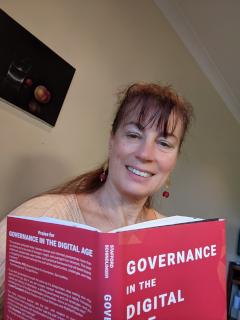|
|
|
|
|
|
|
|
|
Dear reader,
Welcome to The Director's Dilemma August 2022
Each month this newsletter looks at a real-life scenario that happened to a board, perhaps to a board like yours, and considers a range of responses. The scenarios are de-identified to protect the individuals concerned. This month we look at the pros and cons of proceeding with a director appointment after receiving a warning sign that triggers alarms.
I work with boards and directors as a confidential mentor to help them build great companies and maximise their impact, and if you would like coaching from an experienced board mentor, please call me.
To read this email in a web browser, go to www.mclellan.com.au/newsletter.html and click on 'read the latest issue'. I hope you will enjoy the latest dilemma:
 Uma is an emerging company director. She had a solid executive career, joined her first boards in the past two years, and recently accepted her first large, listed, company board appointment. The company is a well-respected multinational with operations in many overseas countries. Uma is an emerging company director. She had a solid executive career, joined her first boards in the past two years, and recently accepted her first large, listed, company board appointment. The company is a well-respected multinational with operations in many overseas countries.
She was ecstatic as she waited for the paperwork to come through.
Then she read an article in a gossipy column of the local business newspaper that suggested her new company had a worryingly high number of joint ventures with another, smaller, company that has been proven or alleged to have paid bribes to secure work in several of the jurisdictions where her new company operates.
She called the Chair to discuss the issue. He was very unconcerned, said these were typical comments made by a journalist who had never been responsible for winning large contracts and didn't know what was involved in making it happen. The Chair stressed that having a slightly disreputable partner could be very helpful when trying to grow in places where facilitation, bribes, and corrupt payment was often a standard cost of business.
Uma is now very concerned about the ethical tone of the board and whether she should continue with the agreed appointment or step down and try for another large, listed company appointment that doesn't arouse the questions she, and every other reader of the newspaper column, is now asking?
|
|
|
|
Lisa's Answer
 As an emerging company director, I can appreciate Uma's predicament. On one hand, a role on a large, listed, well respected multinational company board is exciting yet on the other, learning of potential ethical issues is concerning, and hearing your Chair advise that working with slightly disreputable partners being helpful to the business no doubt rattled Uma, loudly triggering ethical alarm bells. As an emerging company director, I can appreciate Uma's predicament. On one hand, a role on a large, listed, well respected multinational company board is exciting yet on the other, learning of potential ethical issues is concerning, and hearing your Chair advise that working with slightly disreputable partners being helpful to the business no doubt rattled Uma, loudly triggering ethical alarm bells.
Uma needs to use her head and listen to her heart and gut - if it doesn't feel right, it typically isn't. Boards make decisions as a collective - once she joins the Board, Uma needs to own every decision regardless of the alignment with her personal values.
Uma needs to consider several variables. Did she feel the Chair spoke to her or at her during their discussion? How effectively does she feel she can discharge her fiduciary accountabilities including duty of care and diligence?
Uma may wish to consider understanding more about the culture of the Board during her Board Induction - being aware and alert, but not alarmed.
It is important that Uma also understand the ethical tone and culture of the organisation together with current risks, issues and challenges prior to making a decision. Discussions with other Board Members, Managing Director and key leadership team will support this.
Ultimately, Uma needs to ask herself what type of ethical tone the organisations she wishes to govern should display. As an emerging company director, her reputation is important, and no board role is worth compromising her personal values and integrity.
Lisa Coletta is Advisory Board Chair at Everyday Women's Network TV, Founder and Managing Directors of The Governance Collective, and a trainer for The Governance Institute of Australia. She is based in Sydney, New South Wales, Australia.
|
|
|
|
Julie's Answer

Allegations in a newspaper shouldn't worry Uma as much as the Chair's acceptance that business partners may not operate at legally, or morally, acceptable standards.
Uma possibly failed to perform 'personal due diligence' and get to know her future board colleagues before she ties her reputation to theirs.
She doesn't need to reject the appointment immediately. Instead, she should do in depth research on each of her future colleagues, look at companies where they have been on the board or senior executive leadership teams, consider what happened during their tenure, and then have a coffee with each one, and talk about the article, and any episodes of concern from her due diligence.
Uma may have already looked at their professional career trajectories; she needs to add an understanding of their ethics. Fast!
She also needs to assess how open the directors are to altering their views to accommodate hers. Every director on every board needs to be able to influence his or her colleagues and to be willing to be influenced by them.
The chair may set the board's ethical tone but does so with the active and ongoing consent of the whole board. Every change in membership will subtly alter the board's character. A good chair will make those alterations part of the progression planning and will be strategic about hard and soft skills when leading the board in its renewal processes. Perhaps Uma's concerns are the very reason this board feel they need her. Or perhaps this is not a place where she can have a positive influence and it might be better to walk away now.
Julie Garland McLellan is an experienced non-executive director and board advisor based in Sydney, Australia. She travels the world providing director education and board development.
|
|
|
|
Keith's Answer
 When I started my commercial real estate career, my firm's President advised the young brokers that "it is easier to keep a good reputation than to get one back"! When I started my commercial real estate career, my firm's President advised the young brokers that "it is easier to keep a good reputation than to get one back"!
I believe the same thought and care should apply here.
Despite Uma's solid executive career, this could be more harmful to her growth as a board member than be seen as a positive; it could also become an albatross.
Of course, she will have to look at the source of accusations and conduct significant due diligence, starting with further questions for the current Chair of the Board regarding the "slightly disreputable partner(s)"; who are they, and what is their history. If the answer isn't absolutely solid and these bribes are substantiated as even a little questionable, this association would likely follow her for the rest of her career and this opportunity should be passed upon.
Keith Labbett is Managing Partner of AltoPartners/Osprey Executive Search, Co-founder of Canadian University Men's Rugby Championship, and a former Board Member of Santa Claus Parade. He is based in Toronto, Canada.
|
|
|
|
Short practical videos
My recent video on how to read board papers was the most popular I have ever posted. You might like to visit and subscribe to my YouTube channel to see that and all the other videos. There are now over 60 short videos on a range of board topics. Let me know of any topics you would like to see addressed and I will see if I can make a video for you. Please subscribe so you can find it again at a later date. I promise I won't send you spam from YouTube!
Let me help you - I would be delighted to speak for or train your board, staff, audience and/or group. If I can help, please contact me at julie@mclellan.com.au.
Book Review - Governance in the Digital Age by Brian Stafford and Dottie Schindlinger.
 Until the pandemic caused us to review how we met, board practices and protocols had hardly changed in 100 years. A few questions about using zoom transcripts instead of proper minutes had me searching for a modern alternative to Robert's or Horsely's rules for good meeting processes. I still haven't found anything quite so comprehensive, but I did enjoy this little red book. Until the pandemic caused us to review how we met, board practices and protocols had hardly changed in 100 years. A few questions about using zoom transcripts instead of proper minutes had me searching for a modern alternative to Robert's or Horsely's rules for good meeting processes. I still haven't found anything quite so comprehensive, but I did enjoy this little red book.
No technology is a substitute for diligent directors asking insightful questions and listening carefully to the answers before making the best decisions they can in the long-term best interests of the company. There are a lot of tools that can help gather and analyse data, get faster reports, and keep better records. This book gives some insights into the main ones and their applications.
It then investigates the behavioural aspects that can amplify or nullify directors' efforts and brings both process and personality into a cohesive framework to help boards make better decisions. Is your board foundational, structural, catalytic, or futuristic? How can you best use technology and people to get better outcomes? This book has both questions and answers and is well worth reading.
Available at Amazon.
Inspirational quote for August
This month my favourite quote is:

Nothing is more irritating than a director who constantly complains but doesn't fix what he or she is complaining about. Don't be that person. Either change it or get on with it!
Focus your director and board development
Boards often struggle to get cut through and drive company performance. They work hard, then they work harder, then call in a consultant who recommends some changes, then they work harder still.
If that sounds like your board, don't worry. It is likely that you have simply been focusing on the wrong stuff. I have made a diagnostic tool that might help you to prioritise the actions that will free your board from the drudgery and allow you to maximise your impact. You can take the diagnostic here:
https://directorsdilemma.scoreapp.com
Call me afterwards for a personalised action plan to revitalise and enhance the impact of your board work.
A note on names - A few readers have asked me where I find the names for the protagonists in each case study; I 'borrow' them from people I meet or things that I read. Uma is a given name in various cultures. In India, it is the name of the Hindu goddess, who is more commonly known as Parvati. In Sanskrit the word umā can further mean "tranquillity", "splendour", "fame" and "night". For our protagonist Uma to retain her tranquility, she will need to ensure that she can acquit herself in a way that will enhance her 'fame' or good reputation balancing both her commitment to the company and need to ensure that she is not on the board of a company that turns a willingly blind eye to illegal practices.
This newsletter - If you have any ideas for improving the newsletter please let me know. If you are reading a forwarded copy, please visit my website and sign up for your own subscription.
Suggestions for dilemmas - Thank you to all the readers who have suggested dilemmas. They are greatly appreciated. I will answer them all eventually. I could not write this newsletter without your help and without the generous help of all the experts who respond each month to the case studies.
Be a contributor - if you would like to attempt a response to the dilemmas for publication you will be most welcome. Simply reply to this email and let me know. I am always on the look out for new talent from around the world so please reach out if that sounds like something you could do. I am also always grateful for the generous sharing of the current and past contributors. I couldn’t create such an engaging newsletter without their help.
Let's connect - I use LinkedIn to share information about boards and directorship with my friends and acquaintances. If you use LinkedIn and we are not yet connected I will welcome a connection from you. You can find me at linkedin.com/in/juliegarlandmclellan.
Farewell until the next issue due 1 September 2022. I look forward to greeting you again then.
Enjoy governing your companies!
Best regards,
Julie

Main photo by cottonbro from Pexels
Quote Illustraion by Julie Garland McLellan
Disclaimer: The opinions expressed above are general in nature and are designed to help you to develop your judgement as a director. They are not a definitive legal ruling and do not constitute legal advice. Names and some circumstances in the case study have been changed to ensure anonymity. Contributors to this newsletter comment in the context of their own jurisdiction; readers should check their local laws and regulations as they may be very different.
Privacy: I am privileged to have your contact details and keep them as safely as possible. I will alert you if they are ever accessed by any unauthorised person (the technical staff at ayuda help with publishing and issuing the Director's Dilemma and have access so they can send the newsletters to you). I do not sell your details to anyone; they are kept only for the intended purpose - sending you this newsletter and helping to build the judgement of company directors by providing a safe way to consider potential responses to real life events.
|
|
|
|
|
|
|
 Uma is an emerging company director. She had a solid executive career, joined her first boards in the past two years, and recently accepted her first large, listed, company board appointment. The company is a well-respected multinational with operations in many overseas countries.
Uma is an emerging company director. She had a solid executive career, joined her first boards in the past two years, and recently accepted her first large, listed, company board appointment. The company is a well-respected multinational with operations in many overseas countries.
 As an emerging company director, I can appreciate Uma's predicament. On one hand, a role on a large, listed, well respected multinational company board is exciting yet on the other, learning of potential ethical issues is concerning, and hearing your Chair advise that working with slightly disreputable partners being helpful to the business no doubt rattled Uma, loudly triggering ethical alarm bells.
As an emerging company director, I can appreciate Uma's predicament. On one hand, a role on a large, listed, well respected multinational company board is exciting yet on the other, learning of potential ethical issues is concerning, and hearing your Chair advise that working with slightly disreputable partners being helpful to the business no doubt rattled Uma, loudly triggering ethical alarm bells.
 When I started my commercial real estate career, my firm's President advised the young brokers that "it is easier to keep a good reputation than to get one back"!
When I started my commercial real estate career, my firm's President advised the young brokers that "it is easier to keep a good reputation than to get one back"!

